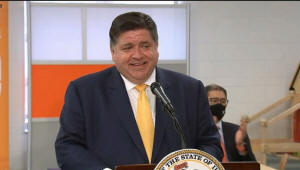Pritzker expands state child care subsidy, increases reimbursement rates
 Send a link to a friend
Send a link to a friend
[June 14, 2022]
By PETER HANCOCK
Capitol News Illinois
phancock@capitolnewsillinois.com
 SPRINGFIELD – Thousands more families in Illinois will soon be eligible
for subsidized child care and child care providers will see a pay raise
under a series of initiatives that Gov. JB Pritzker announced Thursday. SPRINGFIELD – Thousands more families in Illinois will soon be eligible
for subsidized child care and child care providers will see a pay raise
under a series of initiatives that Gov. JB Pritzker announced Thursday.
Starting July 1, the state will invest more than $175 million in
additional funding for child care and early childhood education.
Speaking at an early learning center in Chicago, Pritzker said the
initiatives are meant to ease the burden for working families to find
affordable child care while also making it easier for those providers to
stay in business.
“Once upon a time, Illinois state government was known for hollowing out
its vital public services. No longer,” Pritzker said. “When our youngest
families succeed, our whole state reaps the benefits. That's the
Illinois that our residents deserve and together, we're making it
happen.”
Starting July 1, he said, providers enrolled in the state’s Child Care
Assistance Program, or CCAP, which subsidizes child care for low-income
families, will see an 8 percent increase in their reimbursement rates.
In addition, he said, the income eligibility limit to qualify for those
subsidies will go up to 225 percent of the federal poverty level, or
$51,818 a year for a family of three. After that, when families go
through redetermination to see if they are still eligible, the income
limit will go up to 275 percent of the poverty level, or $63,333 for a
family of three.

The governor’s office said in a news release that those increases will
make the subsidies available to an additional 20,000 children.
Pritzker also announced the state will implement a 3 percent
cost-of-living adjustment to reimbursement rates for early intervention
services.
And families that qualify for CCAP with a parent or guardian working in
child care will have their copays capped at $1.
[to top of second column]
|

Gov. JB Pritzker announces new state investments in
child care and early childhood education programs during a news
conference at the Metropolitan Family Services Learning and Wellness
Center in Chicago. (Credit: Blueroomstream.com)

Child care providers will also have additional time to qualify for Child
Care Restoration Grants, which have been funded with federal COVID-19
relief funds. That program had been set to expire this month, but it is
now being extended through December, delivering an estimated $60 million
to approximately 2,400 child care providers.
And Pritzker announced his administration is extending the Strengthen
and Grow Child Care Grant program through June 2023. That program,
funded through the American Rescue Plan Act, provides funding for
eligible child care centers, child care homes and group child care
homes.

Additional policy changes announced Monday include eliminating child
care copays for families experiencing homelessness; expanding
eligibility to parents and guardians who are attending online school
from home; continuing to provide three months of child care assistance
for unemployed parents seeking to reenter the workforce through December
2022; launching an early childhood enrollment campaign, including
investments in community outreach; and extending the hold on family fee
collection for early intervention services through the end of this
calendar year.
“The significant investments that were announced today prioritize
equitable and stable funding for early childhood across Illinois,” said
Bethany Patten, associate director of the Department of Human Services’
Division of Early Childhood. “They focus on expanding access to early
childhood care and education for low-income families who need it and
investing in child care workers and providers so that they can continue
to serve families in their communities.”
Capitol News Illinois is a nonprofit, nonpartisan news
service covering state government that is distributed to more than 400
newspapers statewide. It is funded primarily by the Illinois Press
Foundation and the Robert R. McCormick Foundation. |